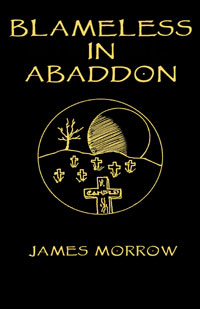 This book is the sequel to the book from last week, which earned James Morrow the appellation of Christianity’s Salman Rushdie.
This book is the sequel to the book from last week, which earned James Morrow the appellation of Christianity’s Salman Rushdie.
So it turns out that God’s not dead, he’s only mostly dead, and the cash-strapped Vatican sells off the 2-mile-long Corpus Dei to the Baptists, who tow it to Florida and install it as the main attraction in a religious theme park, naturally. Everything is going along fine until a Pennsylvanian protagonist named Martin Candle undergoes a series of personal tragedies and gets it into his head to tow the divine body to The Hague and put God in the dock for crimes against humanity. The resultant show trial pits this modern-day Job against a thinly-veiled fictional version of C.S. Lewis and provides Morrow with the opportunity to comprehensively put theodicy to the test. And I do mean comprehensively. All the classic counterarguments to the problem of evil are thoroughly covered, in dialectical fashion, and this turns out to be a way more compelling read than the relevant collection of philosophical essays. (Although I certainly would recommend those as well.) You know how Ayn Rand sometimes has her characters give heavy-handed foot-stomping courtroom speeches that do not really engage with her ideological opposition? This is nothing like that. Except for the courtroom setting, of course.
This book is more complex, much darker, and more directly theological than its predecessor. I enjoyed it somewhat less, but would recommend it more, and for the same reason: Engaging with the problem of pain is bound to be painful. The author pulls no punches with extended and vivid descriptions of human suffering, and though I first read this book 15 years ago, I’m still hesistant to revisit some of those passages. Don’t let that slow you down, though, especially if you’re young and lucky enough not to have experienced tragedy firsthand. Share and enjoy!
Shameless podcast plug – If you’d like to hear more from James Morrow, I have an old interview of him up here and here.
